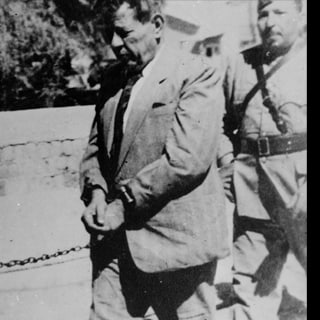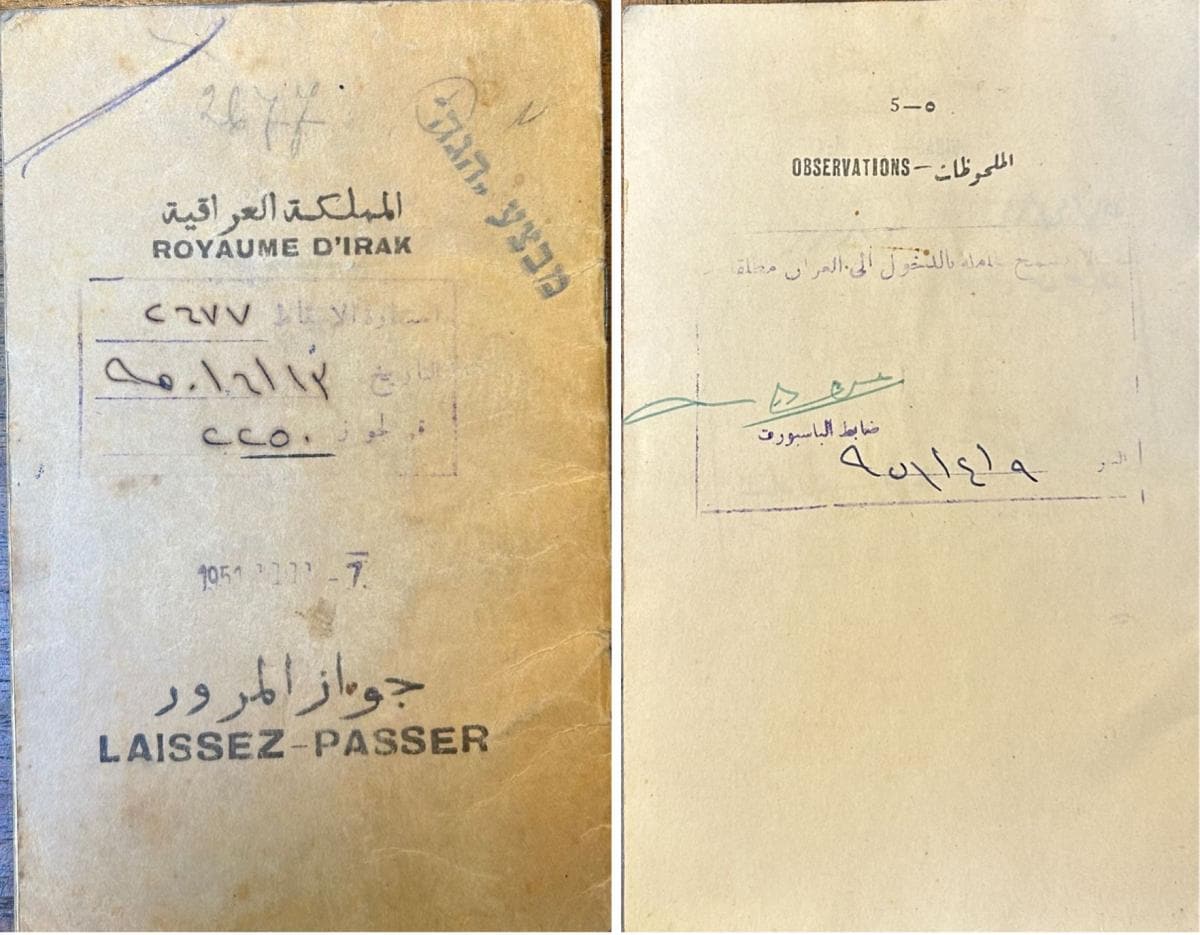Part 2
The Trial And Execution Of Shafiq Adas
The trial of Adas and the circumstances around the trial have been covered extensively by Iraqi writers in the post-Saddam era. Most impressive was the two volumes on the history of the Jews of Iraq written by Al-Ruba'i, which provide an extensive background to the trial and its aftermath.
[4]
Adas was tried by a military tribunal under the presidency of Colonel Abdullah al-Na'sani for allegedly selling weapons to Zionists. In fact, what he sold, in partnership with Muslim businessmen, was scrap metal that was purchased from the British army, which maintained a strong presence in Iraq during WWII. "Witnesses" were brought to testify that Adas was guilty. Three well-known Muslim attorneys came down to Basra from Baghdad as defense attorneys, but al-Na'sani would not allow them to cross-examine any of the "witnesses" for the prosecution. Al-Na'sani also informed the lawyers that he would not accept witnesses for the defense. The lawyers decided to resign and left Adas defenseless.
The novelist Louie Abbas Hamza in his play
The Carrier of the Umbrella describes the scene of the hanging quite dramatically:
"The verdict to hang Adas in Basra on September 23, 1948 was carried out in the early morning hours, which coincided with his 48th birthday. The cool early morning, or the darkness of the place or the awe of the gallows did not prevent thousands of people from Basra and elsewhere to gather, some since the evening before, to watch and celebrate the event. While the mob was celebrating the gruesome event, members of the Jewish community remained in their homes behind closed doors afraid, that a jubilant mob may turn violent."
According to Hamza, Adas was hanged not once, but twice, because the doctor in charge of the event claimed that Adas's heart was still beating after the first hanging, and three policemen had to lift him back up for a second hanging. This was in keeping with Iraqi criminal code that hanging must be carried out until death.
The hanging was carried out in front of a new house Adas was building, which ironically indicated that he had no intention of leaving Iraq. Some newspapers at the time claimed that the new house was meant to be the embassy of Israel. As to why an embassy will be in Basra and not in Baghdad the capital, the newspapers did not explain.
Documents unsealed by the British government 30 years after the event show that the British Ambassador to Iraq Sir Henry Mark wrote on September 20, 1948 to the Foreign Office in London that he met with Prime Minister Muzahim al-Pachachi and told him that the British system opposes the hanging of an innocent man. Al-Pachachi replied: "The matter was in the hands of the Regent and while the Regent opposes the hanging he believes that the national interest leaves him no choice."
Similarly, U.S. Ambassador to Iraq George Worth wrote to the State Department about his meeting with the Regent, who told him he could do nothing but approve the verdict. The Regent was under pressure by the army and key political actors, such that failing to approve the verdict would jeopardize the future of the Kingdom.
Al-Na'sani himself has his own version of the trial. According to one writer, al-Na'sani said to a circle of Jews with whom he had relations: "I have sentenced Adas to death because I was aware that the Iraqi people were seeking a sacrifice. If Adas were not hanged, they would have made pogroms against the Jews in Iraq, in revenge for the many Iraqi soldiers who died in the war. By hanging Adas I have saved the Jews from massacres."
[5] Tragically, there may have been an element of truth to what al-Na'sani said.
Many years later, Jabbar Jamal al-Din, a poet and professor at Najaf University, wrote a beautiful eulogy:
"[Adas] is one of those who plants roses in the Spring Garden. [He] was an honorable merchant among the merchants of Iraq. His concern was not profit or loss, but rather his only concern was serving the oppressed and providing relief to the disadvantaged. Perhaps the truest characteristic added to this authentic Iraqi is that he is the creator who taps into the human heart and sings in our hearts songs of joy and tragedy."
[6]
The hanging of Adas had a dramatic impact on the Jewish community in Iraq and provided the trigger for their seeking to leave. Mir Basri, a writer and historian and the last president of the Jewish community in Iraq, was quoted that the trial and execution of Adas demonstrated clearly that if even a Jew from a highly reputable family who was fully integrated within the Iraqi society, such as Adas, was not safe from punishment, clearly the Jews had no future in the country.
[7] Anwar Shaul, a highly regarded Jewish Iraqi poet, also made the point that the execution of Adas intensified the efforts of the Jewish youth of Iraq to exit the country in all possible manners.
[8]
Denationalization Of Iraq's Jewry
Less than two years after the hanging of Adas, the Iraqi parliament passed without deliberations in March 6, 1950 a law permitting the government to abrogate or denationalize the Iraqi nationality from any Jew who wanted to leave the country. Those who opted to leave were issued a laissez-passer with the inscription: "The bearer's Iraqi nationality has been annulled and he will absolutely not be granted entry to Iraq."
My own Iraqi laissez-passer with the stamp: "The bearer's Iraqi nationality has been annulled and he will absolutely not be granted entry to Iraq." Also stamped are the date I relinquished my Iraqi citizenship – June 13, 1950 – and the date of the exit from Iraq, April 9, 1951.
Some might argue that the law allowing Jews to renounce their nationality and leave the country was fair and reasonable, since those who did not wish to renounce their nationality could ostensibly remain. However, the government imposed economic measures tantamount to economic suffocation. All Jews working in government agencies and public entities were fired, and pressure was used to force them to resign in order to deny them their pensions. Access to bank accounts was restricted and all import licenses to Jews were denied. Travel outside Iraq was severely restricted, and universities denied entry to Jewish students. In short, the law allowing Jews to renounce their nationality and leave sounded voluntary the reality left the Jews no choice but depart.
This closed the long history of Jews coming from Babel to sovereign Iraq, and it opened the chapter about the Jewish refugees from Iraq to Israel.
For me personally, at age 18, with a secondary school diploma and neither prospect of higher education nor opportunities for a fruitful occupation or employment, I had no alternative to leaving Iraq. Like many in my generation, I relinquished my citizenship and left Iraq. I have no regrets, and never over the past seven decades have I considered seeking a "right of return" to Iraq.
The trial and execution of Shafiq Adas 75 years ago are fairly well documented. The purpose of this report is to shed light on the political atmosphere that prevailed in the Iraq that led to his tragic death, which ultimately triggered the mass emigration of Iraqi Jews. For me, this story is...

www.memri.org








